

Impossible Burger becomes gluten-free in new reformulation. Dive Brief:
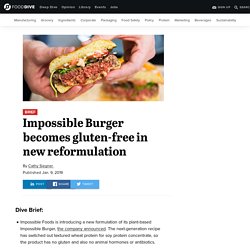
Meal kits go express: Sun Basket, Purple Carrot, and Home Chef introduce time-saving meal options. A recent Packaged Facts report authored by Cara Brosius, an industry analyst with the Freedonia Group, described the enthusiasm American consumers first had for the meal kit segment, but found that the category has struggled and must address issues consumers have around price, subscription models, convenience, and variety.
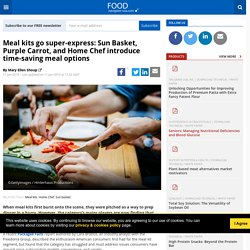
Over the past few months, Home Chef, Purple Carrot, and Sun Basket have all introduced different solutions for time-crunched consumers who are looking for a meal in as little as five minutes. Sun Basket’s organic 5-minute salads This past week, meal kit provider Sun Basket launched its line of four salads that come together in five minutes. Interbev : Le flexitarisme au cœur de la nouvelle campagne de communication. Interbev.
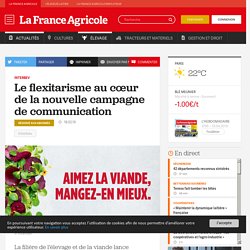
Les bières artisanales pourraient peser 440 millions d’euros en 2020 [Etude Xerfi] Poulehouse lance le premier gâteau qui ne tue pas les poules ! - Pour nourrir demain. Poulehouse lance le premier gâteau qui ne tue pas la poule et ouvre le débat sur la traçabilité des produits transformés.
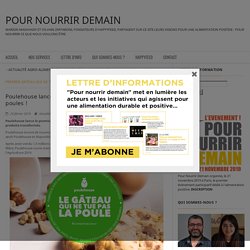
Ynsect lève 110 millions d’euros pour devenir le leader mondial des protéines alternatives. Ÿnsect, entreprise française innovante spécialisée dans l’élevage d’insectes et leur transformation en ingrédients premium destinés aux marchés de l’alimentation animale (animaux domestiques et po...
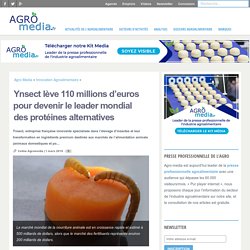
Bientôt une norme pour les produits végétariens et végétaliens / Qualité. Le marché du végétal est en fort développement.
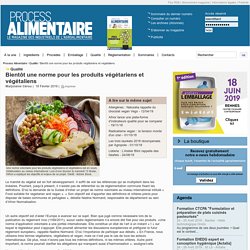
Il suffit de voir les références qui se multiplient dans les linéaires. Pourtant, jusqu’à présent, il n’existe pas de référentiel ou de réglementation commune fixant les définitions. D’où la demande de la Suisse d’initier un projet de norme volontaire au niveau international intitulé « Food suitable for vegetarian and vegan ». « Son objectif est d’apporter des définitions et critères précis pour disposer de bases communes et partagées », détaille Nadine Normand, responsable de département au sein d’Afnor Normalisation.
Un autre objectif est d’aider l’Europe à avancer sur ce sujet. Bien que jugé comme nécessaire lors de la publication du règlement Inco (1169/2011), aucun cadre réglementaire n’a encore été fixé pour ces produits. L'étiquetage d'origine de la viande et du lait dans les plats cuisinés prolongé jusqu'en 2020. Danone, D'Aucy, Herta... Quand des acteurs de l’agroalimentaire financent la transition agricole. Lait : Le mot « équitable » mis à toutes les sauces. Lait réservé aux abonnés « Le lait biologique équitable ne doit pas être qu’un affichage pour vendre plus cher, mais une véritable démarche de qualité et de transparence », affirme Éric Guihery, secrétaire national de la Fnab.
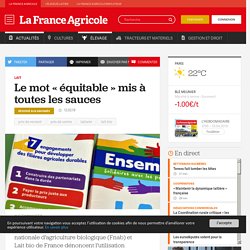
Vous avez parcouru 26% de l'article. 6 trends to impact the food industry in 2019. In 2019, both everything and nothing will be new in the food and beverage business.
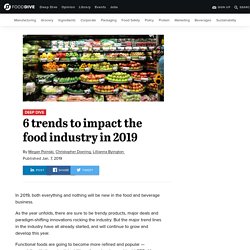
As the year unfolds, there are sure to be trendy products, major deals and paradigm-shifting innovations rocking the industry. But the major trend lines in the industry have all already started, and will continue to grow and develop this year. Functional foods are going to become more refined and popular — especially with the potential addition of now-legal cannabinoid CBD. More big M&A deals — as well as many small ones — will chart the course for where Big Food is heading next. Can whole milk in schools help the dairy industry?
Dive Brief: In an effort to increase consumption of fluid dairy milk, last month, two congressmen introduced The Whole Milk for Healthy Kids Act of 2019 (H.R. 832), which would allow whole milk to be served with school lunches.The bill was put on the floor by Rep.
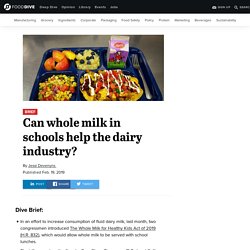
Glenn Thompson (R-Pa.) and Collin Peterson (D-Minn.) and is starting to gain support from dairy organizations, according to Dairy Reporter. Right now, students in U.S. public schools have access to skim, 1% and 2% milk options that are both flavored and unflavored. Dive Insight: World’s first ‘no-kill’ eggs on sale in Germany. Organics sector on the rise as both domestic production and imports see large increases. Between 2010-17 there was a dramatic increase in the amount of EU agricultural land dedicated to organic farming whilst imports also fulfil an important role, notes the market briefs on organic farming in the EU and on organic imports.
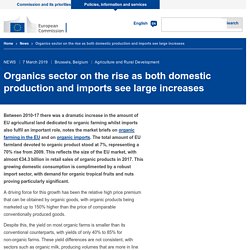
The total amount of EU farmland devoted to organic product stood at 7%, representing a 70% rise from 2009. This reflects the size of the EU market, with almost €34.3 billion in retail sales of organic products in 2017. This growing domestic consumption is complimented by a robust import sector, with demand for organic tropical fruits and nuts proving particularly significant. A driving force for this growth has been the relative high price premium that can be obtained by organic goods, with organic products being marketed up to 150% higher than the price of comparable conventionally produced goods.
Despite this, the yield on most organic farms is smaller than its conventional counterparts, with yields of only 40% to 85% for non-organic farms. Soupes : Cinq grandes marques épinglées par foodwatch. Les 10 tendances alimentaires de 2019 selon Whole Foods. CFIA 2019 / Tendances : Découvrez 5 ingrédients de la confiance. La blockchain déployée à l’échelon international. À la une, Consommation, Distribution, Filière — Par A D le 5 décembre 2018 9 h 55 min ©Photo Xdr Militant du bon, du sain et du local, Auchan Retail applique la blockchain à la traçabilité des produits de ses filières. Menées avec Te-Food, start-up allemande, les premières expérimentations au Vietnam ont été un succès.
Elles s’exportent aujourd’hui en France, en Italie, en Espagne, au Portugal et au Sénégal. De la graine à l’assiette, toutes les étapes de la vie d’un produit sont désormais accessibles aux consommateurs, en toute transparence : la blockchain mobilise tous les acteurs impliqués dans la vie d’un produit. Auchan Retail a donc expérimenté le processus au Vietnam avec Te-Food grâce à une solution de blockchain publique nommée FoodChain. Après de longues décennies de diabolisation du gras, le beurre est remis à l'honneur sur les packagings. Pwc au menu confiance et innovation 2018. Legrand-acquiert-la-start-up-francaise-netatmo-specialiste-de-la-maison-connectee. A round-up of France's top food start-ups.
Click on the headline to read our full interview with each company. ScanUp: The app that tells consumers if food is 'ultra-processed' and helps manufacturers reformulate The developers of ScanUp, an app that allows consumers to scan food products and see just how ‘processed’ or ‘ultra-processed’ they are, are working with manufacturers to develop simple products that score more highly. The duo launched the app in 2017 so that consumers could “make the right food choices ”. One year later, ScanUp launched a second service – a platform for product co-creation between consumers and brands so that consumers can find the unprocessed products they are looking for. “Manufacturers may choose to reformulate their products to remove ultra-transformation markers such as additives or purified and denatured ingredients,” founder Caroline Pechery said. Food firms aren't doing enough to end forced labor, report finds.
Le-groupe-d-electromenager-seb-presente-des-resultats-contrastes-mais-revoit-ses-objectifs-a-la-hausse. Avec-son-concept-car-ez-pro-renault-presente-sa-vision-de-la-livraison-du-dernier-kilometre. La spiruline, l’algue «miracle», prend ses quartiers dans la région nantaise. Cette algue ancestrale aux multiples qualités nutritionnelles est encore peu cultivée en Europe, pourtant grande consommatrice de ce super-aliment. Dans la région Nantaise, un groupe de maraîchage s’est lancé dans la culture sous serre, avec le soutien de fonds européens.
Dans les grandes serres du groupe de maraîchage Olivier, en périphérie de Nantes, les tomates et les concombres s’épanouissent sur plus de 20 hectares, à l’abri des aléas climatiques, qui pèsent de plus en plus sur l’agriculture en pleine terre. Spécialiste du maraîchage depuis douze générations, le groupe Olivier a misé sur la tomate et le concombre, des marchés stables. Mais depuis trois ans, l’entreprise familiale s’est aussi lancée dans la culture de spiruline, une microalgue aux multiples vertus nutritives et antioxydantes. Un végétal de plus en plus prisé par les consommateurs, notamment des végétariens pour sa teneur en protéines, et des sportifs pour ses vertus récupératrices. Un marché encore artisanal. Glyphosate Residue Free inquiries surge as clean food movement gathers pace. “We launched last May, and we got quite a lot of interest, but from March/April this year there has just been a flood of inquiries [fueled by a well-publicized report from the EWG on glyphosate in oat products, a high-profile ruling requiring Monsanto to pay $289m in damages to a man who alleged its glyphosate-based herbicide caused his cancer (which it is appealing) and a flurry of lawsuits vs big food brands over glyphosate residues].
“We’ve had some of the biggest brands in the US and the world contacting us, not just for certification, but more often for an understanding of supply chain pesticide testing," said Rowlands. The reality is that most glyphosate is getting into food products because of dessication And this is an important fact when addressing how to reduce or eliminate exposure, says Rowlands, because a lot of people don’t realize that it’s not simply a question of going Non-GMO, for example, as Non-GMO/conventional crops are using glyphosate as a dessicant too.
Food portal provides best practice resources on managing allergens. A new look food allergen portal, the result of a collaboration between industry, consumer and government stakeholders, is providing best practice resources on managing allergens in food. Food Standards Australia New Zealand CEO, Mark Booth, said the portal, which was launched in early-August, made it easier to navigate and access links to food allergy related resources and information.
“The portal has information for food manufacturers and retailers; the food service sector; childcare centres and schools; government organisations; health professionals and consumers,” said Booth For people who have a food allergy the best way to manage the allergy is to avoid the food allergen. READ: Food allergies are no laughing matter For this reason, there are laws in place, for example mandatory labelling to help people who have a food allergy avoid food allergens. “This portal is an excellent example of what can happen when all stakeholders collaborate to achieve a single purpose,” said Booth. Le-lobby-de-l-alcool-francais-va-financer-la-lutte-contre-l-alcoolisme. Veolia promotes circular economy with launch of organic marketplace. The global resource management company said the new digital platform aims to make it easier for manufacturers to buy and sell products, as well as converting waste streams into cash flow by bringing them into the circular economy.
‘First of its kind’ Veolia said BioTrading was the “first” digital marketplace connecting the organic value chain. The company hopes the resource will save buyers time and money by offering simple search solutions and price comparisons. This will provide buyers with access to a central platform that delivers “transparent and fair” pricing. Currently, no price comparison or trading platform exists for the organic sector, the company claimed. Protéines France publie sa feuille de route. Protéines France, le consortium français d’entreprises qui veut développer les protéines végétales et celles de nouvelles ressources, identifie les enjeux pour la filière afin de faire de la France un leader du domaine à l’horizon 2030.
Afin d’accélérer les développements et d’assurer un avantage compétitif pour les acteurs français du domaine, Protéines France propose qu’une partie des outils de soutien à l’innovation et à l’industrialisation déployés par l’État, notamment dans le cadre du Grand Plan d’Investissement (GPI) et en accord avec les recommandations des états généraux de l’alimentation (EGA), soient orientés vers les projets consacrés à la valorisation des protéines végétales et nouvelles ressources protéiques. Les projections à l’horizon 2050 démontrent que la disponibilité actuelle en protéines ne suffira pas à répondre à la demande mondiale alimentaire. Les produits végétariens poursuivent leur conquête. Xerfi vient de publier une étude sous le titre : « Le marché de l’alimentation végétarienne et végane à l’horizon 2020 - Segments porteurs, percée des MDD, nouveaux entrants : quelles perspectives pour le marché et le paysage concurrentiel ?
"C’est qui le patron" est le plus gros succès pour une nouvelle marque depuis 30 ans. Forte de son succès, la marque "C'est qui le patron" vient de lancer, le 1er février, son premier fruit, la fraise. Une nouvelle aventure après avoir mis sur le marché en 2017 une pizza, du beurre, du steak haché ou encore de la compote. "Avec la fraise, on est typiquement sur un produit que l'on trouve partout et qui n'est pas très bon", explique le fondateur de la marque, Nicolas Chabanne. "En rémunérant bien le producteur, il pourra aller au bout du cycle de la fraise, plus elle est mature, plus elle a de sucre et de goût", ajoute-t-il.
Le succès de "C’est qui le patron" a de quoi remettre en question le modèle du "prix le plus bas", établi par la grande distribution. La petite marque, lancée par des consommateurs en octobre 2016, a explosé ses objectifs. "Les consommateurs ne veulent plus être complices de la crise agricole" Chez cette marque, ce sont les consommateurs qui décident du prix pour offrir une rémunération plus juste aux producteurs. Avec-100-millions-d-euros-en-plus-sofiproteol-veut-soutenir-les-champions-francais-de-l-agroalimentaire.
Accord-trouve-sur-l-appellation-camembert-de-normandie. Salon-de-l-agriculture-la-filiere-proteines-vegetales-fait-les-yeux-doux-a-l-industrie-agroalimentaire. Infographie-le-e-commerce-b2b-un-marche-xxl. Interapi : Création de l’interprofession des produits de la ruche. Tomates : Un label « Sans pesticides, 100 % nature » Ferme France spotlights ‘social values’ in food chain. Ferme France’s founding partners include packaged food manufacturers Sodebo and Fleury Michon alongside cooperative Terrena and cereals group Advitam. The project aims to “gather and support all actors” in the food chain “taking into account social issues” such as animal welfare, the distribution of value in the supply chain, tractability, nutrition and health. Ferme France is also targeting a reduction of phytosanitary problems, negative environmental impacts and biodiversity loss. Ferme France revealed it is an initiative that is based on three pillars.
Food Climate Research Network (FCRN) Rockit, la plus petite pomme du monde, débarque sur les étals français. Facile à glisser dans un cartable ou un sac à main grâce à sa petite taille, Rockit est la plus petite pomme au monde. Cocorico, la bière française aura son label de qualité. Cocorico houblonné : le syndicat professionnel Brasseurs de France a annoncé mardi 20 février le lancement d'un label collectif pour promouvoir la bière française, dans un premier temps auprès des consommateurs français, toujours plus friands de malt et de houblon. Encore un label, un de plus... Les déterminants de la dispersion des prix à la consommation : Analyse de la grande distribution en France.
Europol: False organic certification continues to be major problem for food industry. The report, entitled 2017 Situation Report on Counterfeiting and Piracy in the European Union, looks at the problem across sectors including everyday products, such as cosmetics, toys, medicines, food and beverages and technical products. Brands go for ethical certification to protect reputation, not maximise profits. EU firms have to adhere to minimum levels of traceability under food laws, but they can also choose to add voluntary information and follow one, or a number of, voluntary certification schemes. The team from the University of Milan wanted to explore what motivates businesses to go further than mandatory traceability and follow voluntary certification schemes – specifically those pertaining to environmental or social issues.
They surveyed 131 food manufacturers in Italy, the majority of which were small (62%) and medium sized firms (24%). The businesses worked across a number of sectors, including fruit and vegetables, wine, confectionery and processed seafood. ‘Smart label’ could tackle fraud, bolster food safety. Publication detail - EU Law and Publications. New tool enhances price transparency along the food supply chain. L'Industrie du futur (enfin !) décryptée dans le Glossaire de l'Industrie 4.0. Bleu-Blanc-Cœur engrange des accords auprès d'opérateurs de la restauration. Avec Orange, «Manger bio et local en entreprise» amorce son développement national. 1 poule sur 2 sera élevée dans un élevage alternatif d'ici à 2022. "Mangeons 24" : une Scic pour l'alimentation locale en Périgord (24) Distribution : Biocoop flirte avec le milliard d’euros. Where in the world is this food from? Traceability initiatives let consumers know.
Free-from : ces marques alimentaires qui prônent le "non". Viande bovine : Lancement du bœuf des Hauts-de-France. Animal welfare now serious business rather than a niche option, says global report. Plant Meat Matters: Unilever, Givaudan and Ingredion invest in vegetarian steak. Le partage de l’euro alimentaire : première estimation incluant la restauration. Jouer la transparence : une stratégie gagnante pour regagner la confiance de vos consommateurs. Les déserts commerciaux : fatalité ou nouveaux enjeux ? Internet physique: la logistique du futur est au coin de la rue.
Des-aliments-naturels-sains-et-produits-localement-dans-les-assiettes-du-sial. Les nouveaux business de l'alimentaire. Sial : des usages réinventés, des conditionnements originaux / LES PRODUITS. Strategic task force to help insect firms navigate novel food regulation. The meat companies making vegetarian food: Mainstreaming sustainable eating or dangerous double standards? New policy brief for a booming seaweed industry. Demain, ces sept aliments seront probablement dans votre assiette ! Industry has a big appetite for big data but is wasting its time in other areas: Survey. L’Asie : nouveau marché au bec sucré – quelles opportunités pour l’agroalimentaire français ?
Le WWF révèle les 25 entreprises françaises impactant le plus les écosystèmes mondiaux. Ethical labels are worth €709 billion globally - so which one is best for your product? How to restore consumer confidence after a food scandal. “We’ve never seen consumers as confused!” PepsiCo asks what – exactly – is ‘good for you’ Fish manufacturers should voluntarily improve labelling - or risk boycott. Les entreprises bio: créatrices de croissance et d'innovations pour l'économie française. Kraft-Heinz’s Potential Impact on the Global Health and Wellness Market.
Interest in Asian Cuisines is Driving New Concept and Menu Trends. Produits bio ou produits non bio : l’analyse de leur flore microbienne permet de trancher. Quand le snacking prend du galon : des opportunités d’innovation pour l’agroalimentaire et la restauration. Growth of ‘healthy’ food sales globally, but not at expense of more indulgent foods, research. The Biggest Billionaire Brands in the Food World.
Miniature food trend becoming viral. Les légumineuses : des opportunités de marché agroalimentaire à saisir pour répondre à la hausse de la demande consommateurs. Mieux comprendre les baby-boomers pour s’adresser à ce marché à fort potentiel dans l’alimentaire. Oxfam Behind the Brands report urges companies to 'walk the talk' Europe’s food colouring market to grow to €423.26m. Communities taking control of the food revolution. Intégrer les services écosystémiques et la biodiversité dans la stratégie de l'entreprise. L'innovation alimentaire guidée par le voyage et l'exotisme.
Five Things To Know About Foodservice Growth in China. The Food Industry is Missing a Billion Dollar Trick When it Comes to the Aging Population - Euromonitor International Blog. Bitter emerges as flavor trend that could aid sodium reduction efforts. Le responsive retail expliqué en chiffres... Top 10 food and beverage trends for 2015, Innova Market Insights with other comments. Pepper, le robot-vendeur de machines à café...